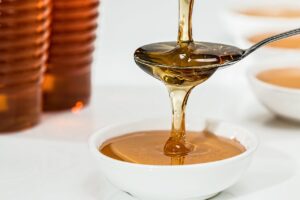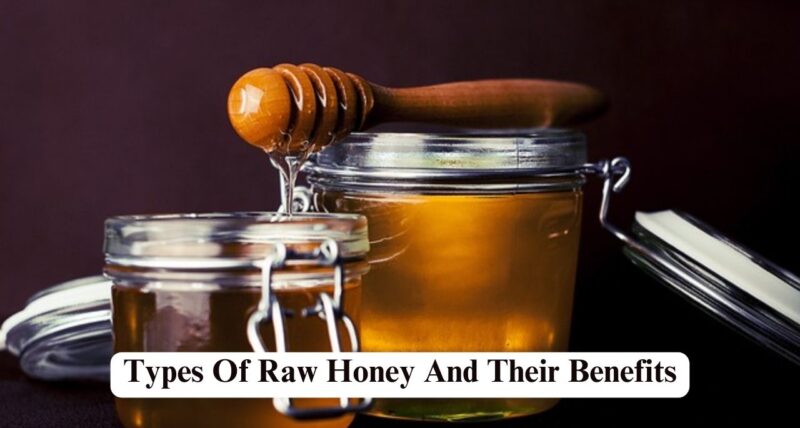Honey, a thick, sweet syrup crafted by bees, is packed with beneficial plant compounds and filled with numerous health perks. While some advocate for raw honey, preserving its natural enzymes and antioxidants, others argue that the processing of regular honey makes little difference. Raw honey, sourced directly from beehives, contains beneficial bee pollen, propolis, and abundant antioxidants. While numerous studies support the superior raw honey benefits compared to processed varieties, there’s a belief among some that pasteurization and processing diminish the beneficial components in regular honey, making raw honey the preferred choice for optimal health benefits.
Types Of Raw Honey

A spoonful of honey is a perfect solution to all kinds of dishes. But do you know honey is available in different types which differ in their texture, taste, and even color? Let’s explore various types of raw honey and their benefits:
Manuka Honey
Manuka honey, renowned for its robust antibacterial qualities, stands out for efficacy in wound healing and immune system reinforcement. Its unique properties, including high levels of methylglyoxal, lend in an exceptional potency against bacteria. Regularly applying Manuka honey promotes faster wound recovery, and it boosts the body’s defense mechanisms.
Wildflower Honey
Wildflower honey, sourced from various floral origins, boasts a complex flavor profile and diverse nutrient composition. Its rich antioxidant content helps combat oxidative stress, while vitamins contribute to overall health. This raw honey variety offers a natural and flavorful way to incorporate essential nutrients into the diet, promoting wellness.
Acacia Honey
Acacia honey, characterized by its delicate flavor and pale color, provides more than just sweetness, showcasing raw honey benefits. Its mild taste makes it a versatile sweetener, while the potential prebiotic properties support gut health by nourishing beneficial gut bacteria. Incorporating acacia honey into the diet offers a gentle way to promote digestive wellness.
Clover Honey
Clover honey, widely available and adaptable, boasts a subtle sweetness derived from clover blossoms, highlighting raw honey benefits. Beyond its taste, this raw honey variety packs various nutrients from abundant clover sources. Its versatility makes it a popular choice for sweetening dishes while providing a nutritional boost from its natural floral origins.
Buckwheat Honey
Buckwheat honey, characterized by its deep color and strong flavor, offers more than just sweetness. Its richness in antioxidants makes it a potent immune booster, ideal for alleviating sore throats and coughs. With its robust taste and healthful properties, buckwheat honey provides a natural remedy for respiratory ailments.
Benefits Of Raw Honey

Here are some of the benefits of raw honey:
Rich In Antioxidants
Raw honey benefits encompass a plethora of antioxidant compounds like phytochemicals, flavonoids, and ascorbic acid. These antioxidants in the raw honey combat oxidative stress by neutralizing free radicals, thereby reducing the risk of chronic diseases like cancer. Moreover, incorporating raw honey into one’s diet contributes to an antioxidant-rich regimen, promoting overall health.
Antibacterial Properties
Honey’s natural antibacterial and antimicrobial properties stem from hydrogen peroxide, glucose oxidase, and its low pH, effectively eliminating harmful bacteria and fungi. Its unique composition prevents yeast and bacterial growth. Manuka honey, a raw variety, specifically demonstrates pathogen-killing capabilities, making it suitable for wound cleansing, as research shows.
Nutritious Properties
Raw honey benefits vary from its diverse nutritional composition, influenced by geographic location and floral sources. Despite the variability, it consistently provides antioxidants, amino acids, and vitamins. These benefits contribute to overall health unaffected by regional or environmental differences.
Healing Properties
Honey aids wound healing due to its antibacterial, anti-inflammatory, and antioxidant properties, with emerging evidence suggesting antiviral and antifungal effects. Its acidity assists in oxygen release, promoting healing. Apply raw honey directly to minor cuts and burns, covering with gauze or a bandage. Manuka honey products are also available for wound care.
Relief From Cough
Honey proves comparable or superior to certain over-the-counter cough medicines. Given safety concerns with OTC options for younger children, honey emerges as a viable alternative for those aged one and above. Its effectiveness in alleviating cough symptoms presents a natural and safer option for pediatric cough relief.
Treats Diarrhea
Raw honey’s soothing properties do alleviate mild diarrhea symptoms. Consuming a teaspoon or mixing honey with a beverage may aid in treatment. However, moderation is key, as excessive sugar intake can exacerbate diarrhea. Raw honey offers a gentle remedy, but prudent consumption is essential for the effective management of digestive discomfort.
In conclusion, raw honey stands as a versatile and natural elixir, offering a myriad of health benefits. From potent antibacterial and antioxidant properties to soothing effects on digestion and wound healing capabilities, it proves to be a valuable addition to a balanced and wholesome lifestyle. Embracing the richness of raw honey not only enhances well-being but also honors the remarkable contributions of nature to our health and vitality.



